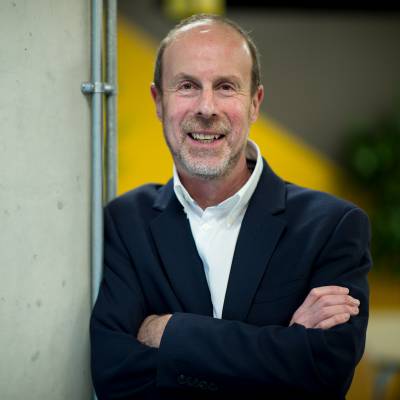Spotlight on Jerry Allen, Director for Entrepreneurship in UCL Innovation & Enterprise
What is your role and what does it involve?
I have the great privilege to be Director for Entrepreneurship at UCL. My role is to deliver a ‘purpose driven’ extracurricular entrepreneurship programme to develop entrepreneurial mindsets and high-quality graduate startups.

Prior to joining UCL in 2017, I was Deputy Director for Entrepreneurship at the University of Greenwich where I developed €8m worth of European projects. Perhaps the most pertinent involved reframing the way host nations view refugees, through a project that increased the social integration of refugees through education and self-employment.
Tell us about something you’re working on at UCL that is supporting the SDGs
We are witnessing Entrepreneurship growing in popularity across UCL, the new Entrepreneurship Community of Practice is a great galvaniser of sharing our collective expertise. Between 2016 and 2021, the number of startups created annually by UCL has grown from 29 to 66. There are 77 startups currently in UCL’s entrepreneurship incubator at BaseKX, all of which have committed to address one or more of the SDGs. This is really encouraging, but we hope to build on this going forwards.
Beyond work, which of your everyday activities contributes most to one or more of the SDGs?
As resident of Brentford, West London, I am lobbying the London Borough of Hounslow to help to achieve the SDG goal to adopt sustainable, inclusive and productive employment. If UCL can create 331 new graduate startups over 2014–-2021 that have collectively raised more than £226m investment and created 1,900 jobs, why can’t Hounslow commit to this level of economic activity for the benefit of our local communities?
And what do you do that has the most detrimental impact on the Goals?
I like to think, that I retain sight of the SDGs. In 2017, I was invited to speak at the United Nations Conference on Trade and Development about refugee entrepreneurship. There, I brought a wristband featuring article 1 of the UN our UN Declaration of Human Rights which I still wear today. I find myself tweaking the wristband as a constant reminder of remaining focused on our societal challenges. It’s almost ironical that this reinforces my determination to keep working towards our SDGs and guide the thinking of today’s student entrepreneurs into creating a better world for tomorrow.
In your opinion, which of the SDGs is the most important for humanity to address?
During 2022, I represented the UK at the Global Entrepreneurship Congress in Riyadh. Here I met a woman from Ukraine supporting fellow Ukrainian women entrepreneurs trying to survive during the war. Having just been moved by a talk on ‘purposeful entrepreneurship’ from a young Indian entrepreneur aiming to change the lives of a billion people, I had to do something to help this Ukrainian woman. Hence, a group of us from the UK set up the ReStart Ukraine Project. It’s an entirely unfunded initiative based on goodwill, including UCL with 30 Ukrainian women entrepreneurs in the pilot who are benefitting from our wider support. I hear the difficulties these entrepreneurs face surviving under daily bomb attacks, limited electricity and being split up from their loved ones, yet I witness such determination to retain their business and rebuild Ukraine, there are so many relevant SDGs pertinent to their struggle.
If there was an 18th Goal, what should it be?
The elimination of war, reducing conflict should be embodied within the SDGs. Although it’s inherent with the constitution of the UN, surely there is more we can do as civilised nations to avoid conflict?
If you could bring in one law or societal shift to help the UK address the SDGs, what would it be?
As an enterprise educator, I would legislate to create community-based entrepreneurship. A national system providing free pre-start training based in high street vacated shops to expose local residents to the learning, the tools and techniques to start their own venture and take responsibility for their own future.
What is the biggest challenge to the world achieving the Goals by 2030?
The short-term nature of political cycles acts as a brake to genuinely accountable SDG commitments. While government policies will surface a target to achieve goals according to the dominant political will and societal pressure at the time, it only takes a slight swing of the political pendulum for targets to be reduced or more critically lost.
What would it surprise people to know about you?
Would it be that every morning I practice yoga for 30 minutes before starting work? It’s a great therapeutic start to my day, a little stretching, a few moments of mindful relaxation. I calculated that since February 2020, I had completed a lot of yoga.
 Close
Close

